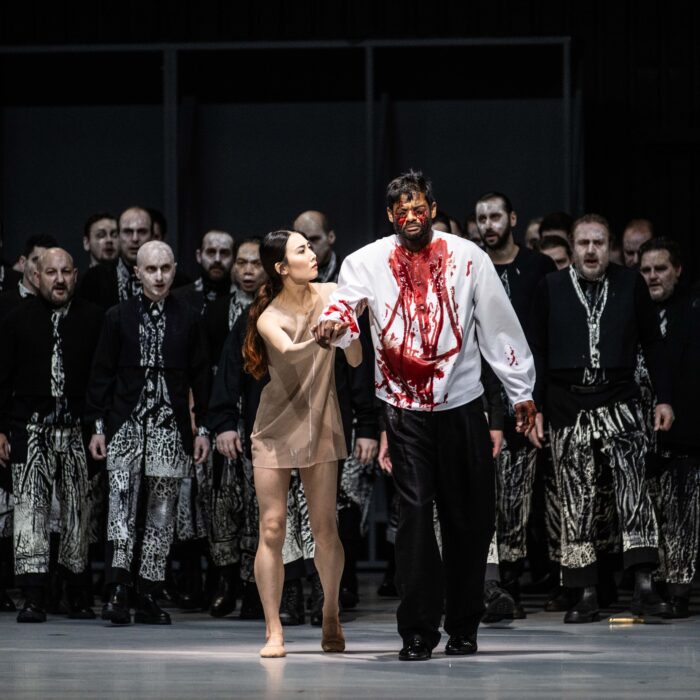
Metropolitan Opera 2017-18 Review – Thaïs: Ailyn Pérez & Gerald Finley Must Be Heard In Gorgeous Revival of Massenet Masterpiece
By David Salazar“The voice must be heard.”
For the last two years, this has been the calling card for the Metropolitan Opera’s marketing department, a call to just come and listen to opera as it is intended to be. An invitation to experience something that can’t be experienced anywhere.
For many, that tagline has been particularly emblematic of the vocal wizardry that has been apparent throughout the first moments of the 2017-18 season. And the new run of “Thaïs” that just opened on Saturday, Nov. 11, 2017, certainly fits that bill and so much more.
The voices must be heard. The orchestra must be heard. The experience must be felt. All those also work for this remarkable production that featured some of the finest casting of any Met production in recent history alongside a conductor suited perfectly for Massenet’s music.
Set in Alexandria, Egypt, the opera essentially follows the story of a monk Athanaël who seeks to redeem a courtesan, Thaïs, from her sinful lifestyle. While he ultimately wins her soul for God, his own identity comes into question as he falls in love with her.
Match Made in Heaven
In the leading roles were soprano Ailyn Pérez and baritone Gerald Finley as Thaïs and Athanaël, respectively. In her role debut, Pérez’s interpretation of the heroine emphasized her alluring and seductive qualities, her voice vibrant with a relaxed and confident quality. Her initial lines were deliciously sung, the legato elegant. You could immediately feel why this particular character was so iconic to those around her. As she taunted Athanaël in an ensuing scene, she threw off Massenet’s sunny melodic lines with corresponding vocal quality, the climax of the scene featuring an astounding high note sung from a platform. If first impressions are everything, then Pérez had her audience won over.
But from there, the composer digs deeper into his lead character, challenging the diva to enter into her tortured state as she questions the person she is and the one she aspires to be. The soprano’s initial lines in “Dis-moi que je suis belle” seemed to hint at frustration over her worthless life, the initial repetitions of that very line tainted with growing frustration. One sensed restlessness growing over the character, but in an insightful twist, Pérez moved in the opposite direction with the constant repetitions at the end of the aria. Instead of growing more insecure, suddenly Thaïs grew more secure, each repetition brighter and more confident in sound, the end of the aria emphasizing that she was ready to embrace her current life and deal with it. With this in mind, her ensuing confrontation with Athanaël had greater tension and her confused ravings at the close of the scene became all the more complex.
When we next see her, Thaïs has already opted for a life of religious servitude and here Pérez allowed her voice to slowly but surely darken and even lighten. Her singing remained refined throughout, but it had a more ethereal quality, the color of her sound a far cry from previous scenes, marking the shift in the character. One could almost feel the character starting anew. As Thaïs grew into her new role, her voice regained in strength, the sound fuller than at any point in the entire opera; this came to its apex in the final duet where the soprano effortlessly built to cathartic high Ds (though she didn’t hold them for much). For a role debut, it was a rather insightful and mature performance through and through.
The same goes for Finley who managed to develop Athanaël from a severe and rigid man to a raving one full of emotional turmoil. His initial entrances were full of assurance, every phrase exact in rhythmic precision, his vocalization appealing and simply beautiful to listen to. He was a spiritual leader through and through and the listener delighted in the gorgeous sound he produced. As he encountered Nicias’ lodging, his sound took on a rougher quality, the delivery pointed and firm, the consonants emphatic. Whereas all the others sang with finesse and vocal freedom, he was precise at every turn. Finley’s body language also reflected this, his movements minimal.
But things started to change in his interactions with Thaïs. We saw him avoid her glances. His singing became more and more frayed, the crispness of sound replaced by a rawer quality more focused on emotional delivery than purity of tone. By the time he enunciates the words, “Je ne la verrai plus!” his voice declaimed the text in almost spoken form, the anguish of the painful truth visceral. The final duet, the character essentially desecrating everything he is and was as a last ditch effort to win over Thaïs saw the baritone at his crudest vocally. And yet, it worked wonderfully in stark contrast to the angelic singing of Pérez. Here too he threw himself to the floor, his body language lacking in poise or confidence.
The two ultimately played up the shifting dynamics wonderfully, highlight the poignant character developments through vocal genius.
Another Wonderful Piece
Not to be overlooked was tenor Jean-Francois Borras as Nicias. The tenor made the most of his stage time, playing up his contrasts to Finley as much as he could. Where the baritone was severe in his interactions with the tenor, Borras was gentle and suave in his phrasing. There was sensuality in his duet with Pérez’s Thaïs, the two singers melding their voices freely and quietly together in a passage that was filled with tenderness and a sense of ampleness. It was rhapsodic, to say the least and certainly hinted at sincere feelings between the two characters. This enabled for Nicias’ “sacrifice” in the ensuing act to feel sincere and motivated.
Stars in the Pit
In the pit, Emmanuel Villaume put in just as excellent a performance and one must no doubt credit him for the genius of his lead artists as well. From the opening chords to the final ones, the polish of one of Massenet’s finest scores was felt. The maestro balanced every sound throughout the ensemble, his delicate approach in the opening scene with the monks establishing the purity of their religious fervor. This allowed for him to play with greater range in the second scene where the growing sound of the orchestra seemed at conflict with Finley’s voice (without ever overpowering or drowning him). In this context, one could sense the overwhelming feeling of the character being a fish out of water. Also interesting in his approach was the sense of consistent meter. Most often associate French music with having a looseness and almost improvisatory style with its lyrical freedom. And many conductors get away with it, despite often sacrificing a sense of dramatic pacing for emotional effect. Villaume balanced the two perfectly, keeping the drama moving forward always, but leaving space for lyrical expansiveness, best seen in the gentle duet between Thaïs and Nicias and even more subtly in the first duet between the title character and Athanaël in the first scene of Act three.
Moreover, by starting the entire performance with a more delicate interpretation, the maestro gave himself and his singers room to slowly build up the music and the emotional instability that Athanaël experiences. The transition between the second and third scene of Act three was riveting for its punctuated accents and sudden sense of aggression. It always sustained its sense of poise and musical elegance, but one could feel the music jolting in a manner that hadn’t been present in earlier scenes.
The violin solo, as played by David Chan, followed closely with Villaume’s suave approach to the score, the legato lines refined and the emotional crescendos and outbursts contained, emphasizing the inner turmoil of the character, rather than extroverting it. The repetitions of the melody that occur more and more frequently in the latter sections of the opera took on an even sweeter tone each time, expressing the growing sanctification of the heroine.
Subtle Symbolism
Perhaps the least exciting element of the entire evening was John Cox’s production, which premiered just a few years ago. Rather traditional in design, the production works with the idea of contrasts that dominate the opera. Athanaël and Thaïs exist on opposite ends of the spiritual spectrum at the start of the opera and then wind up crossing paths and ending on their respective opposites. The desert and city are often placed at odds to express the differences between the religious people and those that indulge in carnal behaviors. To this end, Cox’s production design plays with a complementary color scheme wherein the warm desert is contrasted with the cooler and more frivolous world of the partygoers such as Nicias and Thaïs at the start of the opera. Slowly, but surely these two color schemes start to fuse, particularly in the final two scenes when Athanaël’s spiritual integrity comes under fire. Thaïs’ wardrobe also undergoes a transformation, starting off with flashy pink and eventually ending with pure white, echoing her transformation from courtesan to virtuous saint.
And while the symbolism is subtle and even nuanced in some parts, the productions own poor handling of transitions leaves some dramatic and emotional gaps, particularly during the famed Meditation that essentially represents the opera’s midpoint. When the curtain comes down prior to the famed passage, we leave Thaïs confused about which direction to take. Does she leave behind her life and take on a holy existence? Or does she stay put and potentially sacrifice her soul? It’s a major decision for the character. When the curtain rises, the decision has been made.
But the audience has not been made privy to it because the curtain was down during the famed meditation, wherein the heroine contemplates and eventually makes this transcendental decision. It is her turning point, but we are only allowed to intuit it through the music and nothing more. The transformation somehow felt somewhat incomplete. Perhaps some might find that the music suffices here, and yet a theatrical experience should be all-encompassing and hearing sets rumbling around while the meditation is performed takes the audience right out of one of the core moments of the drama, reminding us that the choice to proceed in this manner was more out of necessity for scene changes rather than for true dramatic effect.
Massenet’s opera is often overlooked in favor of other masterworks that paint with far broader strokes. In many ways, this opera is his most intimate, the cast minimal and the composer’s predilection for investigating quotidian lifestyles essentially non-existent. The razor sharp focus on the two leads places great demands on the interpreters, making it a challenge for any opera house to mount.
But in the case of this Met production, the two lead singers are at their absolute finest led by a conductor that was born to conduct this music. Safe to say that you don’t want to miss experiencing this masterpiece.


